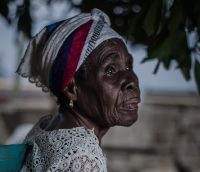 |
| Old woman showing her makeshift toilet. Credit: UN News By Ojonugwa Yahaya from HipCity Innovation Centre |
Among human communities, there are some behaviours which have negative impact the people and endangers the health of the entire population. Most times, the people ignore the consequences because they believe it is an age-old practice and their forebears were not affected by it, or because of a fear of change. Also, when these people weigh their options and feel the cost of behavioural change outweighs their usual behaviour, they are usually unwilling to change.
On the list of such unhealthy behaviour is the monster called open defecation (OD).
Open defecation is the emptying of bowels in the open without the use of properly designed structures built for the handling of human waste such as toilet. People may choose to defecate in the fields, bushes, forest, canal, ditches, street or other open space. According to World Health Organisation open defecation pollutes the environment and causes health problems. Open defecation is linked to the high prevalence of water-borne infectious disease such as Diarrhoea, Cholera and Hepatitis A, among others. It is also linked to high child mortality, poor nutrition and poverty in Nigeria.
The reasons that have been given by people who practice the habit of open defecation have either been poverty that makes it a challenge to build latrines or lack of government support in providing toilet facilities. In cases where the toilets are available, but people still end up preferring to defecate in the open, the reason can extend to cultural beliefs related to sharing toilets among family or non-family members. An example is can be found in communities where it is forbidden for a man to share the same toilet with a woman who is menstruating or a woman who newly gives birth to a child. In some other cases, people prefer open-air defecation due to the freedom it gives them as opposed to using a small dark structure or the inconvenience of using toilets that are dirty due to poor maintenance culture.
Open defecation in Nigeria has a negative impact that cannot be overemphasised. It is not limited to local communities: even in the bustling city centres, open defecation is practiced predominantly by the people in these communities. Take the Federal Capital Territory (FCT) Abuja for example. In communities such as Shere (Bwari), Rije (Kuje), Leleyi Gwari (Kwali), Kaida (Gwagwalada), and even in the city centre like Jabi (Jabi Motor Park) and Utako Market etc, open defecation is very obvious.
Following the declaration of a state of emergency on Nigeria’s Water supply, Sanitation and Hygiene (WASH), the inauguration of the National Action Plan for the Revitalization of Water supply, Sanitation and Hygiene (WASH) by the Nigerian government at the State House Conference Centre on 8th November 2018, and the national launch and flag-off of Clean Nigeria; Use the Toilet campaign on 19th November 2019, one would have envisaged that Nigeria would have made great strides in tackling the issue of open defecation in practicable terms. The opposite, however, is the case, with Nigeria topping the rank of countries practicing open defecation in the world in year 2020; a position formally occupied by India.
This is a national issue and quite the shameful one.
According to the findings from the 2018 WASH National Outcome Routine Mapping (WASHNORM) survey, 47 million people in Nigeria defecate in the open; that is, 1 in 4 Nigerians defecate in the open. Out of 47 million Nigerians who practice open defecation, 16 million live in the North Central, with Kogi State topping the list in the North Central.
The cost of open defecation on the development of Nigeria as a country cannot be overemphasised. The cost of open defecation in Nigeria includes:
• Economic Cost: Nigeria loses about 1.3% (N455 billion) of Gross Domestic Product (GDP) annually due to poor sanitation as a result of illness, low productivity, loss of learning opportunities etc.
• Health Impact: More than 100,000 children under 5 years die each year due to diarrhoea; of which 90 percent is directly attributable to unsafe water and sanitation. Nigeria is the second country with the highest children’s deaths due to diarrhoea
• Impact on Child Development: 1in 4 children under 5 years exhibit severe stunting, while 1 in 10 are wasted, due to frequent episodes of diarrhoea and Water, Sanitation, and Hygiene (WASH) related illnesses.
• Low Productivity: Frequent episodes of WASH-related diseases cause absence from school or work, as affected people take time off to heal, and some to take care of a sick relative.
• Poor Education Outcomes: Reduced school enrolment and attendance due to time lost in search for water and frequent episodes of WASH-related illnesses.
• Loss of Dignity and Security: Open defecation results in loss of dignity, increased risks of insecurity and violence against women and children.
Source: (www.cleannigeria.ng)
The Nigerian government has an action plan to end open defecation by the year 2025. The Federal Ministry of Water Resources in partnership with other relevant government agencies, NGOs, CSOs, and few private entities are showing their commitment through the Clean Nigeria; Use the Toilet campaign towards achieving the open defecation-free (ODF) target of 2025. In a press statement by the Minister of Water Resources, Engr. Suleiman Adamu, on August 26, 2020, he stated that 27 out of the 774 local government areas in Nigeria were certified open defecation-free (ODF). This indicates that the journey towards achieving total ODF in Nigeria is still very far.
Attaining rapid success and effectiveness with the Clean Nigeria; Use the Toilet Campaign depends on:
• Strong political commitment in leadership at all levels and increased in budgetary allocation towards improved sanitation and ending open defecation.
• Increased collaboration amongst development organizations and civil society organizations working to improve sanitation and end open defecation.
• Increased and timely support from the media for the dissemination of behavioural change messages, and increased coverage of human-interest stories on sanitation and hygiene.
• Increased private sector engagement in the WASH sector through business investment and corporate citizenship/corporate social responsibility. Also, sanitation and hygiene awareness creation through branding and promotion.
• Increased and well-targeted Water Sanitation and Hygiene (WASH) funding at all levels, especially for rural areas.
• Increased rural community engagement by ensuring the full participation of the community heads, women and youths in disseminating the message of proper sanitation and hygiene among the community dwellers.
Sanitation is everybody’s business and for Nigeria to attain open defecation free (ODF) Nigeria, all hands needs to be on deck. The government, NGOs, CSOs, private sector, media and as individuals we all have a role to play in ending open defecation in Nigeria.





